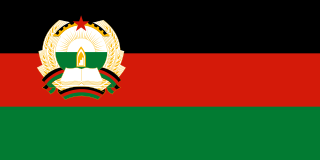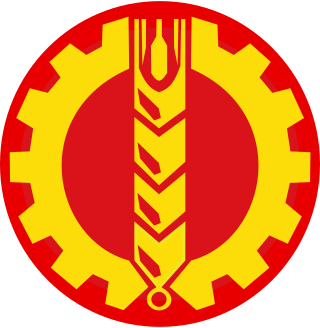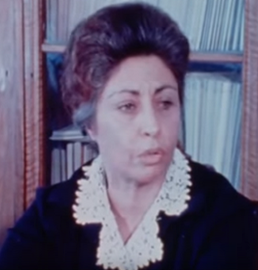Related Research Articles

Babrak Karmal was an Afghan revolutionary and politician who was the leader of Afghanistan, serving in the post of General Secretary of the People's Democratic Party of Afghanistan for seven years.

Mohammad Najibullah Ahmadzai, commonly known as Dr. Najib, was an Afghan politician who served as the General Secretary of the People's Democratic Party of Afghanistan, the leader of the one-party ruling Democratic Republic of Afghanistan from 1986 to 1992 and as well as the President of Afghanistan from 1987 until his resignation in April 1992, shortly after which the mujahideen took over Kabul. After a failed attempt to flee to India, Najibullah remained in Kabul. He lived in the United Nations headquarters until his assassination by the Taliban after their capture of the city.

The Democratic Republic of Afghanistan (DRA), renamed the Republic of Afghanistan in 1987, was the Afghan state during the one-party rule of the People's Democratic Party of Afghanistan (PDPA) from 1978 to 1992.

The People's Democratic Party of Afghanistan (PDPA) was a Marxist–Leninist political party in Afghanistan established on 1 January 1965. Four members of the party won seats in the 1965 Afghan parliamentary election, reduced to two seats in 1969, albeit both before parties were fully legal. For most of its existence, the party was split between the hardline Khalq and moderate Parcham factions, each of which claimed to represent the "true" PDPA.
The following lists events that happened during 1996 in Afghanistan.
The following lists events that happened during 1981 in Afghanistan.

Nur Muhammad Taraki was an Afghan revolutionary communist politician, journalist and writer. He was a founding member of the People's Democratic Party of Afghanistan (PDPA) who served as its General Secretary from 1965 to 1979 and Chairman of the Revolutionary Council from 1978 to 1979.
Sultan Ali Keshtmand, sometimes transliterated Kishtmand, was an Afghan politician. He served twice as Chairman of the Council of Ministers during the 1980s, from 1981 to 1988 and from 1989 to 1990 in the Democratic Republic of Afghanistan.
Parcham was the name of one of the factions of the People's Democratic Party of Afghanistan, formed in 1967 following its split and led for most of its history by Babrak Karmal and Mohammed Najibullah. The basic ideology of the Parchamites was one of a gradual move towards Islamic socialism in Afghanistan. The Parcham faction supported this idea because they felt that Afghanistan was not industrialized enough to undergo a true proletarian revolution as called for in the Communist Manifesto.
Khalq was a faction of the People's Democratic Party of Afghanistan (PDPA). Its historical de facto leaders were Nur Muhammad Taraki (1967–1979), Hafizullah Amin (1979) and Sayed Mohammad Gulabzoy (1979–1990). It was also the name of the leftist newspaper produced by the same movement. The Khalq wing was formed in 1967 after the split of the party due to bitter resentment with the rival Parcham faction which had a differing revolutionary strategy.

Colonel General Abdul Kadir Dagarwal was an Afghan politician, diplomat, and a military officer in the Afghan Air Force who participated in the coup d'état that created the Republic of Afghanistan under the President Dawood Khan, and later directed the Afghan Air Force and Army Air Corps squadrons that attacked the Radio-TV station during the Saur Revolution. He served as the acting head of state for three days when the People's Democratic Party of Afghanistan (PDPA) took power and declared the foundation of the Democratic Republic of Afghanistan, before handing over power to PDPA leader Noor Mohammad Taraki. He later served two terms as Minister of Defense, the first as part of the Taraki government from April to August 1978, and the latter as part of the Babrak Karmal government from 1982 to 1986. His second term took place during the Soviet war in Afghanistan.
The following lists events that happened during 1978 in Afghanistan.
The following lists events that happened during 1979 in Afghanistan.
The following lists events that happened during 1982 in Afghanistan.
The following lists events that happened during 1983 in Afghanistan.
Ghulam Dastagir Panjsheri was an Afghan communist politician and public servant. Panjsheri was usually identified as a Khalq by fellow Afghan politicians, while outside observers said he was creating his own PDPA group under the name Gruhi Kar.
Mir Akbar Khyber was an Afghan left-wing intellectual and a leader of the Parcham faction of People's Democratic Party of Afghanistan (PDPA). His assassination by an unidentified person or people led to the overthrow of Mohammed Daoud Khan's republic, and to the advent of a socialist regime in Afghanistan, the Democratic Republic of Afghanistan.

The Revolutionary Council of the People's Democratic Party of Afghanistan (PDPA) ruled the Democratic Republic of Afghanistan from 1978 until its collapse in 1992. The council was the supreme state power under the communist regime and was a carbon copy of the Supreme Soviet in the Soviet Union. The point with the council was to convene on a semiannual basis to approve decisions made by the presidium.

Anahita Ratebzad was an Afghan socialist and Marxist-Leninist politician and a member of the People's Democratic Party of Afghanistan (PDPA) and the Revolutionary Council under the leadership of Babrak Karmal. One of the first women elected to the Afghan parliament, Ratebzad was deputy head of state from 1980 to 1986.
Parliamentary elections were held in Afghanistan between August 29 and September 11 1969. They were the second elections after the introduction of the 1964 constitution, with 2,030 candidates standing for the 216 seats of the House of the People and for one-third of the House of Elders. The single-member plurality electoral system was used.
References
- 1 2 J. Bruce Amstutz (1994). Afghanistan. DIANE Publishing. p. 65 . Retrieved 2009-03-22– via Internet Archive.
Council of Ministers Afghanistan.